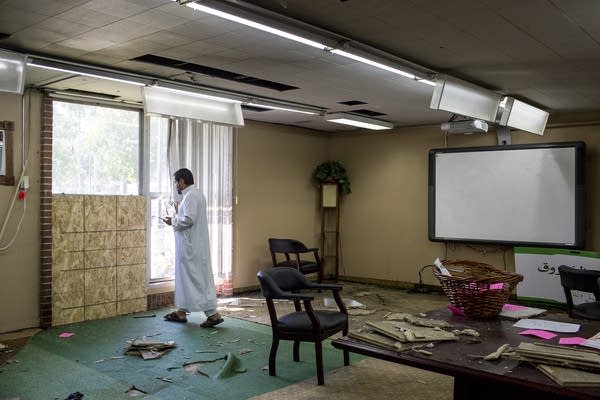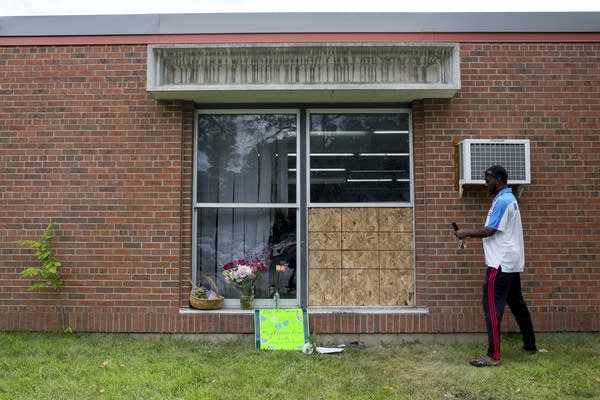Muslims concerned as FBI avoids 'terrorism' label for mosque bombing

It took the FBI fewer than 24 hours to acknowledge last year's stabbing attack at a St. Cloud shopping mall as a possible act of terrorism.
Dahir Adan, a 20-year-old Somali-American man, stabbed 10 people at the Crossroads Center mall last September before he was shot dead by an off-duty cop.
"We are currently investigating this as a potential act of terrorism. And I do say 'potential,'" Rick Thornton, the FBI's special agent in charge for Minneapolis, said at the time. "There's a lot we don't know."
But following Saturday's bombing of Bloomington's Dar Al-Farooq Islamic Center, law enforcement and local media outlets have yet to use the word "terrorism" in describing the incident.
Create a More Connected Minnesota
MPR News is your trusted resource for the news you need. With your support, MPR News brings accessible, courageous journalism and authentic conversation to everyone - free of paywalls and barriers. Your gift makes a difference.
That has some of the Muslim community and others saying there's a double standard at play in discussing the attack.
"I don't know what their intent was, but in my eyes, and in the eyes of anybody who wants to realize what this is — it's a terrorist attack," said Hodan Hassan.
She had planned to take her 13-year-old son to weekend school at Dar Al-Farooq on Saturday morning.
But then came horrifying text messages from the mosque saying classes were canceled.
So, Hassan scoured the news. It was several hours before the first reports came trickling in. When they did, she said the media referred to it as an "explosion." Hassan said that minimizes the crime.
"When you target someone's worship place, when you throw a bomb, and to instill fear in someone else's heart," Hassan said, she thinks that constitutes terrorism.
She was relieved to hear Gov. Mark Dayton call it an act of terrorism. U.S. House Rep. Keith Ellison also called the perpetrators "terrorists."

After Saturday's bombing, Thornton told reporters it was too early to say much at all without a suspect or a motive firmed up.
"A lot of the questions we've been receiving from the media thus far," Thornton said, include "is it a hate crime? Is it an act of terrorism? Who did it? That's what the investigation is going to, is to determine who and what the motivation was."
He did not take questions at the press conference, and the FBI declined to comment for this story. A statement from Thornton released Monday afternoon said the investigation is the bureau's top priority, and that "every available resource has been and will continue to be focused on this case until it is solved."
One key difference between the St. Cloud stabbing and the Bloomington bombing is that it was immediately clear who the perpetrator was — Adan was killed during the stabbing.
For the Bloomington incident, there is no obvious suspect, let alone what motivated that person. The FBI has only said that the perpetrator used an improvised explosive device, or IED, to blow out the imam's office. No one was hurt.
Former U.S. Attorney Tom Heffelfinger said investigators are typically loath to speculate on motivation without having many of the facts in hand.
"Rushing to call something a crime of terror without the evidence is premature," he said, adding that law enforcement's reticence suggests the investigation is far from complete.

But Heffelfinger is confident the bombing amounts to a hate crime — based on even the scant amount of information available.
That's important, he said, because hate crimes — like terrorism — are considered high-priority for law enforcement.
"I mean, my goodness — doing it right before the first prayer session of the day? I mean, it was clearly a hate crime," Heffelfinger said.
Still, Asad Zaman, who directs the Muslim American Society of Minnesota, said he's concerned the FBI and other law enforcement agencies have avoided any mention of terrorism while describing the incident.
He said he can only imagine the hype if circumstances of the bombing were different.
"If the victim were not Muslim, there would be discussions of terrorism. The 'T-word' would have been used," Zaman said. "If the perpetrator was Muslim, the 'T-word' would definitely be used."
MPR News correspondent Doualy Xaykaothao contributed to this story.